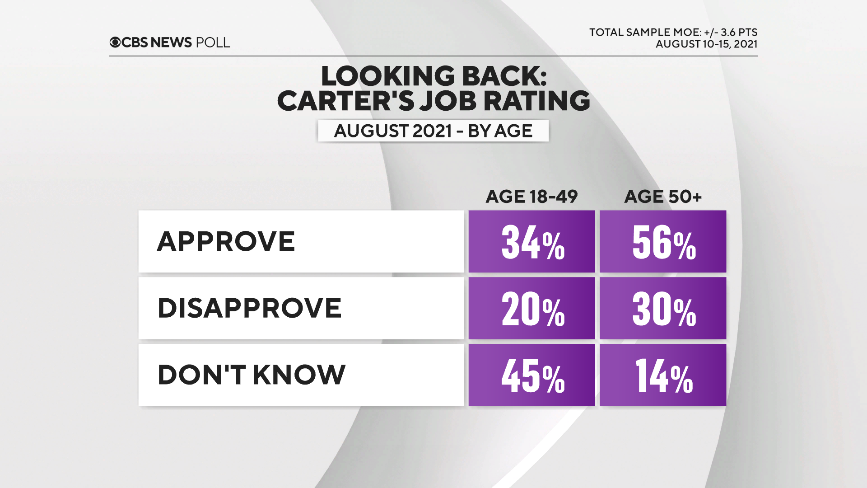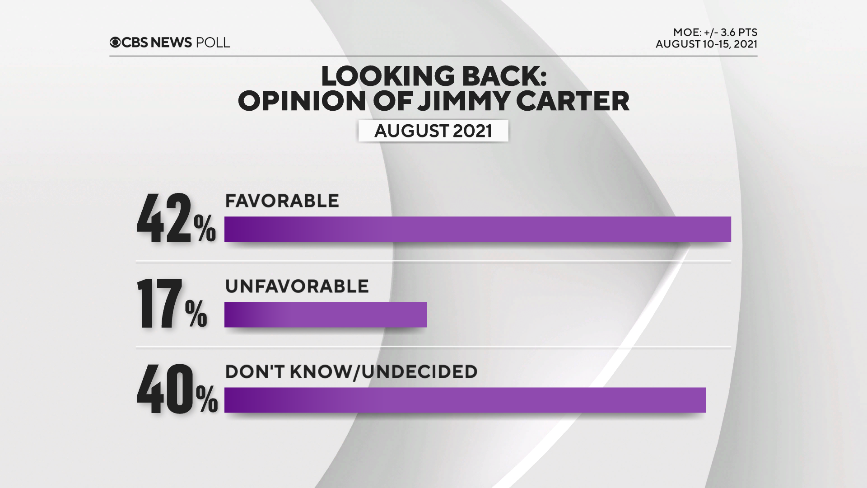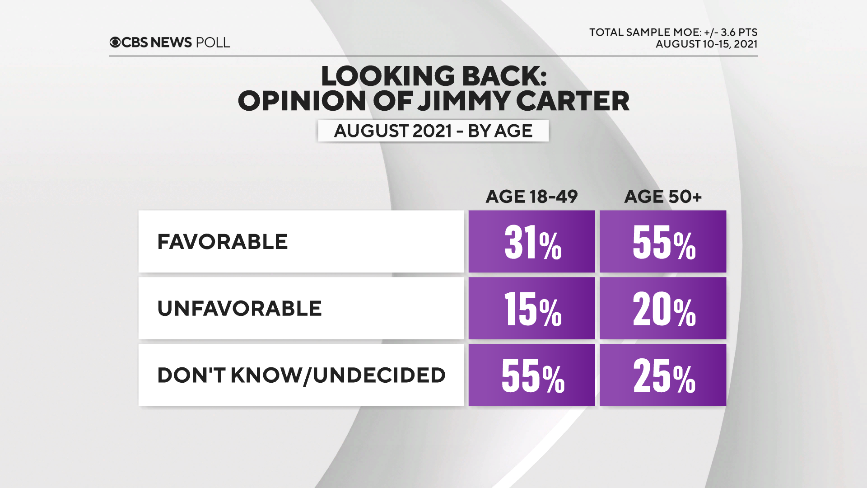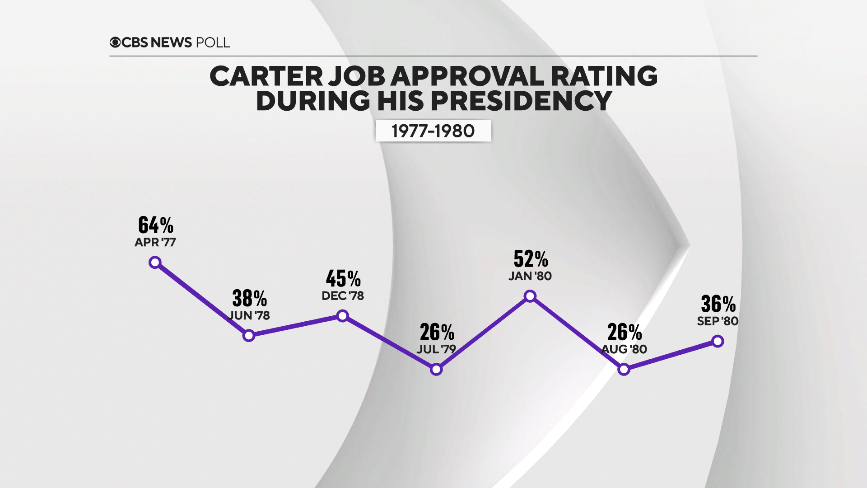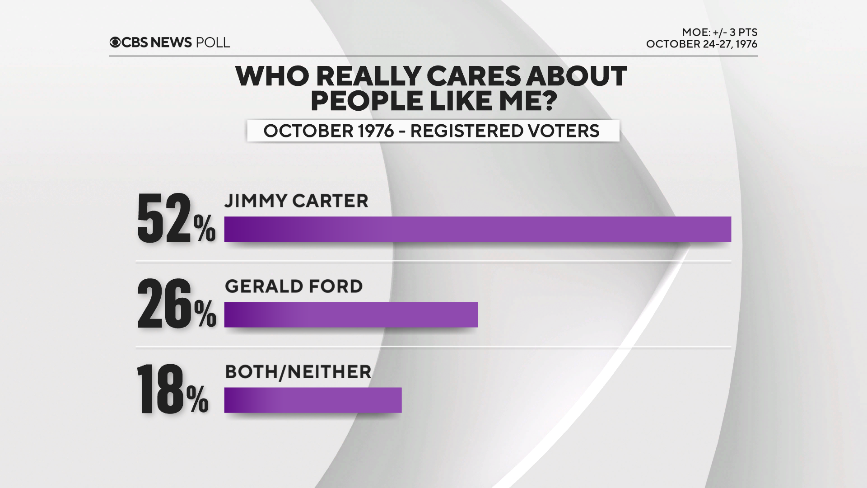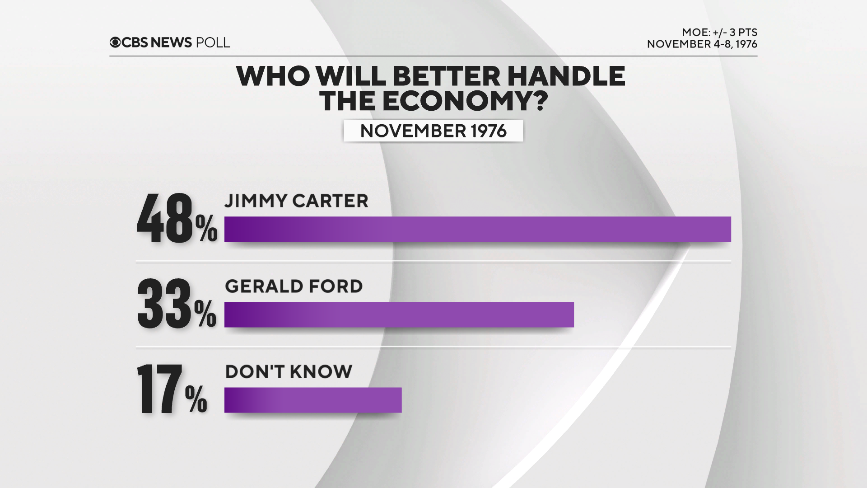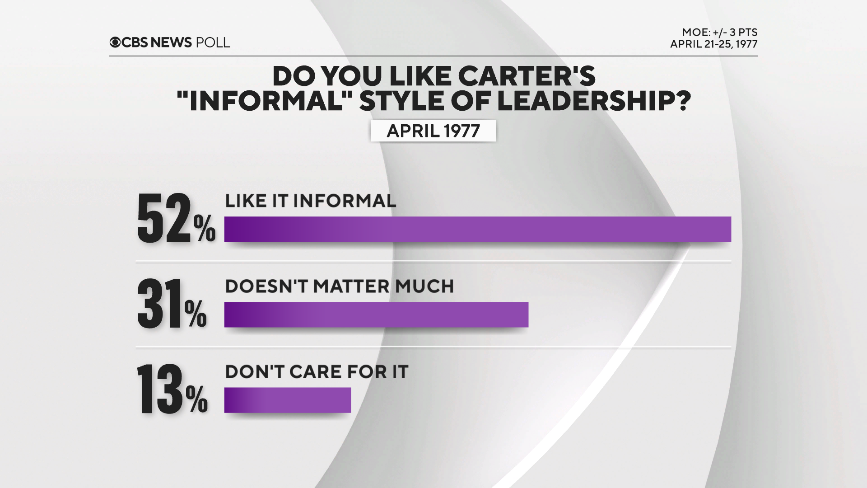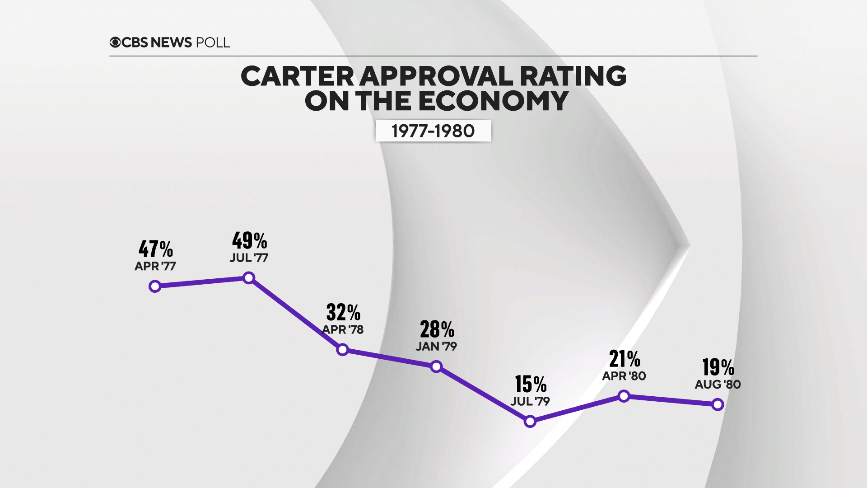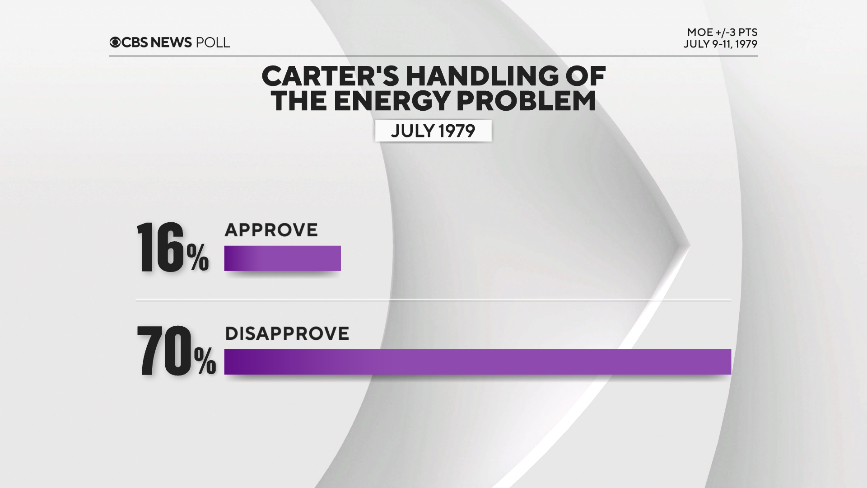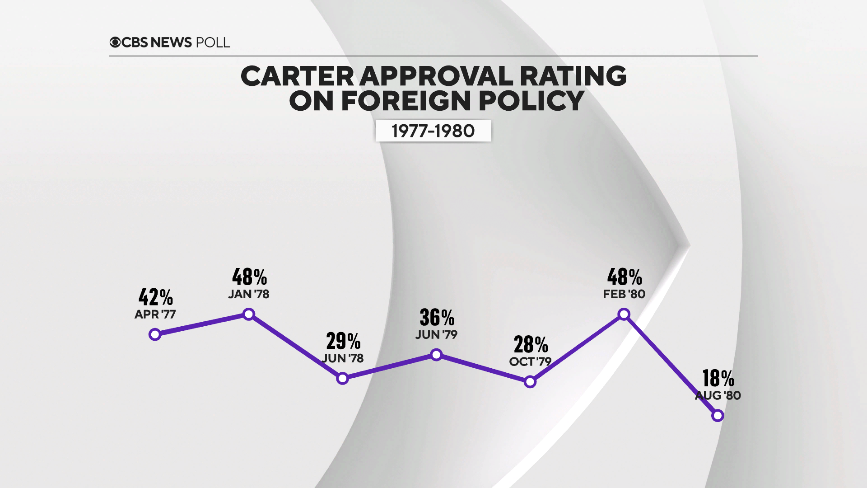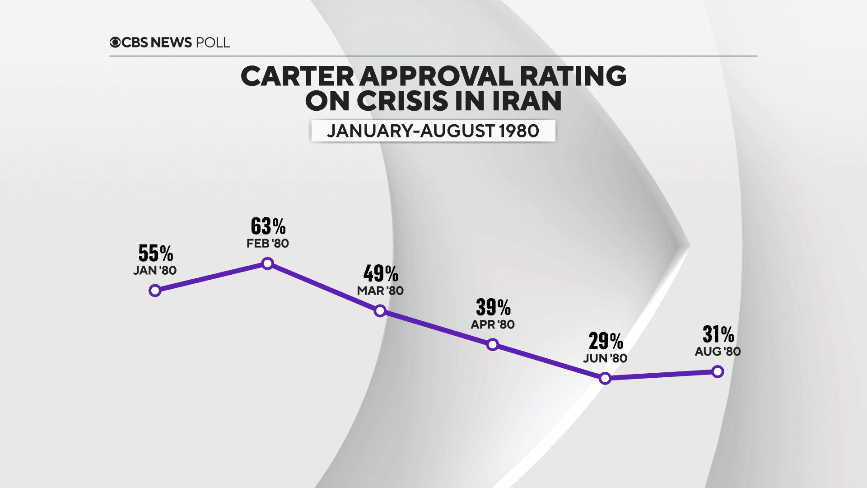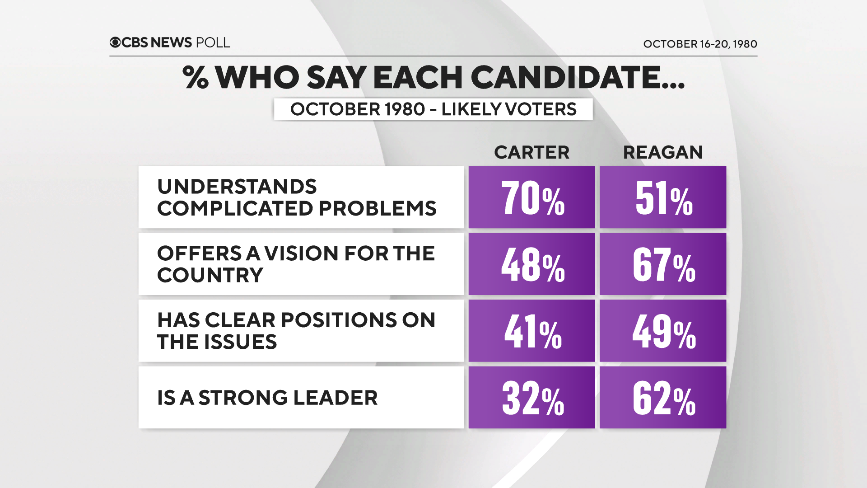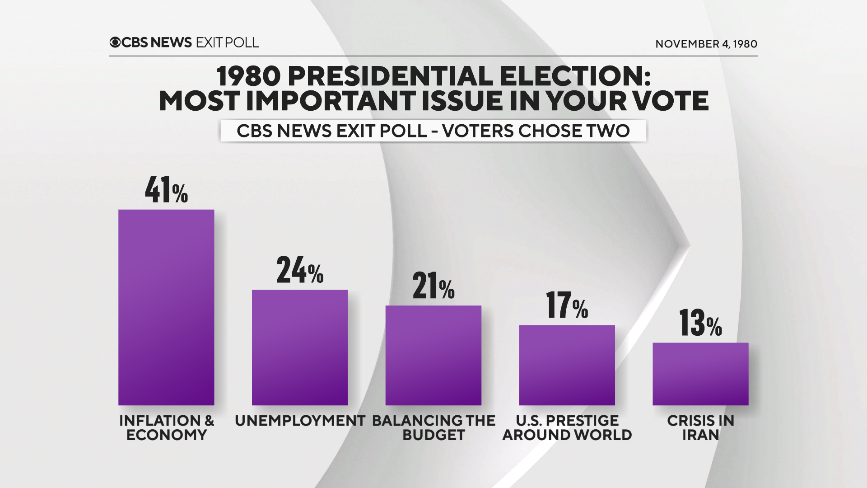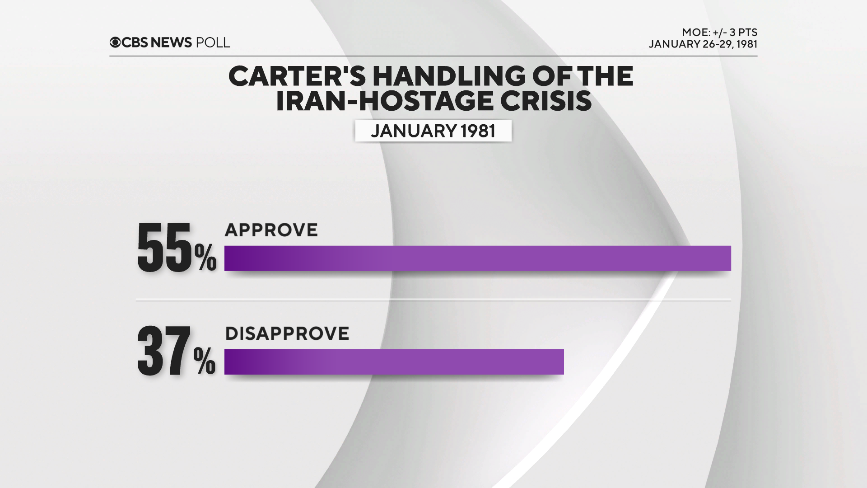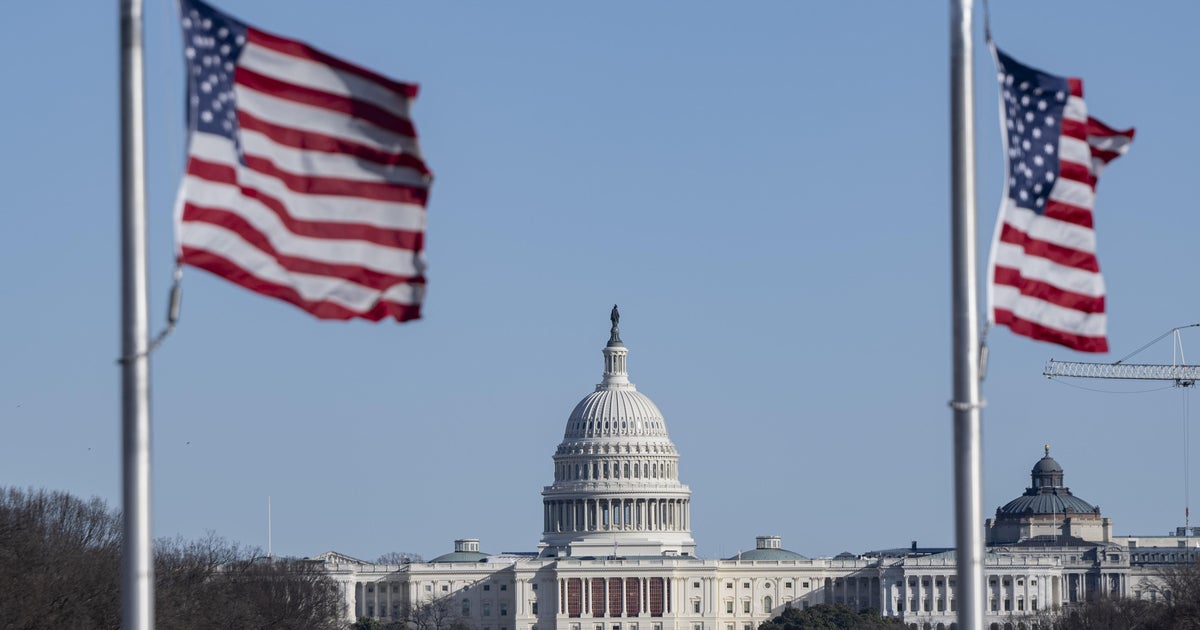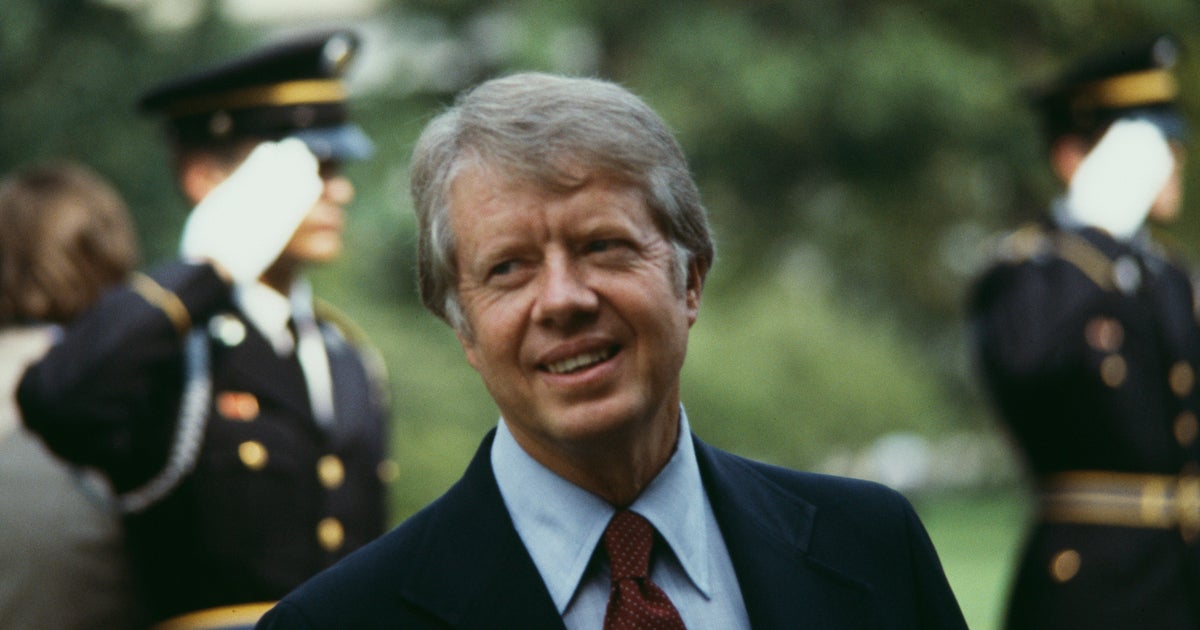CBS News poll analysis: How public opinion changed about President Jimmy Carter
The CBS News poll was launched back in 1976, so President Carter was the first president that CBS polling covered for his full term in office. We looked back into our archives at how the public viewed Mr. Carter during those years.
Looking back, Americans today view former President Jimmy Carter more positively than they did at the end of tenure in office.
When Carter left office in 1981, the public was divided in their assessment of his presidency and negative in their view of him personally. While seen by the public as intelligent and caring, Carter suffered from a perceived lack of leadership ability — a shortcoming that was particularly notable in contrast to his Republican successor in the Oval Office, Ronald Reagan. Public approval of Carter declined as the U.S. was faced with a number of economic challenges, including high inflation, high unemployment, and the 1979 energy crisis, and international challenges as well, notably the Iran hostage crisis that began towards the end of his term. Though Carter's failure to free the hostages during his tenure in office looms large in the public discourse when looking back on his single term in office, polling shows that it was the president's low approval rating in handling the country's economic challenges that may have ultimately played the key role in determining the outcome of his failed re-election bid.
In August 2021 — before Carter entered hospice care — CBS News asked Americans to look back at the Carter presidency, and they gave him a net positive rating for how he handled his job. At 44%, his approval rating was the same as when he left in Jan. 1981, but far fewer Americans gave him negative marks in 2021 than they did 40 years earlier. And though many younger Americans don't have an opinion, most Americans over the age of 50 — those old enough to remember the Carter presidency — say they approve of how he handled his job as president.
More recently, the Gallup organization asked Americans about how they viewed past presidents and how they did their job. In June 2023 — a few months after it was publicly released that Carter was receiving hospice care — 57% of Americans said they approved of how he handled his job as president.
Personal views of Jimmy Carter
Views of Carter personally have also improved over the years.
By the time Carter lost the presidency in Nov. 1980, more voters had an unfavorable (49%) opinion of him than viewed him favorably (39%).
But by 1994, a majority of Americans said they viewed the former president favorably. When CBS News last asked about Jimmy Carter in 2021, Americans still viewed him favorably on balance. Though most younger Americans didn't have an opinion either way, most Americans over fifty had a favorable opinion of him.
President Carter's job rating while in office
Carter began his presidency with a high job approval rating, but that quickly started to decline, as did evaluations of his handling of the economy. Though Carter was the beneficiary of an initial rally effect after the seizure of the U.S. Embassy in Iran and the Soviet invasion of Afghanistan at the end of 1979 — his approval rating rising over 20 points by Jan. 1980 — that initial bump in public approval would not last, and Carter entered the 1980 fall election season with an approval rating of just 36%.
Carter received his lowest job approval mark in July 1979 at the height of the energy crisis (and just before his famous "crisis in confidence" or "malaise" speech). Then CBS News recorded that just 26% of Americans said they approved of how he was handling his job as president — a low that was reached again in August 1980). This low approval rating for a president would not be reached again until the end of George W. Bush's second term in office.
The 1976 presidential election
Carter headed into the final stretch of the 1976 presidential election with a slight edge over incumbent Republican President Gerald Ford. Though voters thought Ford was more of a leader, they picked Jimmy Carter as the candidate who cared more about people like them.
Economic concerns also played a role in Carter's victory in 1976. In a national poll conducted by CBS just after the 1976 election, Americans cited unemployment and the high cost of living as the two most important problems facing the United States. When asked in Nov. 1976 which presidential candidate they thought would be more likely to do a better job handling the country's economy, more Americans chose Carter over Ford.
The Carter Presidency: Early Optimism
When Carter was poised to enter the Oval Office in Jan. 1977, seven in 10 Americans said they were optimistic about the next four years with Carter as president. Though few Americans believed he would be able to rein in inflation, most believed he would restore trust in government, make it more efficient, and reduce unemployment.
At Carter's 100-day mark in April 1977, CBS's first recorded approval rating for President Carter was at 64% — the highest for his presidency (Gallup recorded a 75% approval rating a month earlier in March 1977). Carter received net positive ratings for both his handling of the economy and foreign policy (though many Americans remained unsure). Most Americans also said they liked the way he was doing things: 52% of Americans liked his "informal" style of leadership.
Economic challenges and the energy crisis
Though the economy was an issue that helped Carter get elected, the public's confidence in his ability to handle the country's economic problems decreased as inflation and interest rates continued to rise, and by April 1978, most Americans disapproved of how Carter was handling the national economy. Confidence reached its low point during the 1979 energy crisis. In July 1979, 70% of Americans said they disapproved of the way Carter was handling the energy problem, and just 15% approved of how he was handling the economy overall.
Foreign policy and the Iran hostage crisis
Americans also had reservations about Carter's handling of foreign policy in general, particularly the Iran-hostage crisis. Carter's approval rating on foreign policy never rose above 50%, and it went down considerably as the hostage crisis continued through 1980, reaching a low of just 18% in August of that year.
Americans rallied behind Carter at the beginning of the hostage crisis, and his overall approval jumped to 52% in Jan. 1980 (the first time since in more than a year that his overall approval rose above 50%), But support for his handling of the situation declined as the crisis went unresolved, reaching its low point in June 1980.
The 1980 presidential election
Carter lost the 1980 presidential election to Ronald Reagan 51% to 41%, with third-party candidate John Anderson getting 7% of the vote.
Carter suffered from a perceived lack of leadership in comparison to Reagan. In a CBS News Poll conducted a month before the election, registered voters were twice as likely to describe Ronald Reagan as a strong leader than they were to describe Carter that way. Carter fared better when voters assessed his intellect — more voters believed that Carter understood the complicated problems a president had to deal with than did Ronald Reagan — but more voters said it was Reagan rather than Carter who both offered a vision for the country and who had clear positions on the issues.
How much did the hostage crisis hurt Jimmy Carter?
Though Carter received low marks for his handling of the Iran crisis while he was in office, it was largely economic concerns that seemed to have been on the minds of voters when they elected Ronald Reagan in 1980. In the 1980 CBS News exit poll, far more voters cited economic factors such as inflation and the economy, jobs and unemployment, and balancing the federal budget as the issues that most affected their choice for president. Only 13% of all voters — and only 7% of those who voted for Ronald Reagan — specifically cited the crisis in Iran as an important factor in determining their vote choice.
After the hostages were freed in Jan. 1981 — and after Carter had already lost his reelection bid and left office — the public's view of Carter's handling of the Iran hostage crisis was largely positive. In Jan. 1981, 55% of Americans said they approved of how he handled the problem of the American hostages in Iran. And though it was too late to help his reelection bid, it seems many Americans did give him credit for finally getting the hostages released. In Jan. 1981, the Harris poll reported that 67% of Americans rated Carter as either "excellent" or "pretty good" when it came to finally working out the deal to get the hostages out.

